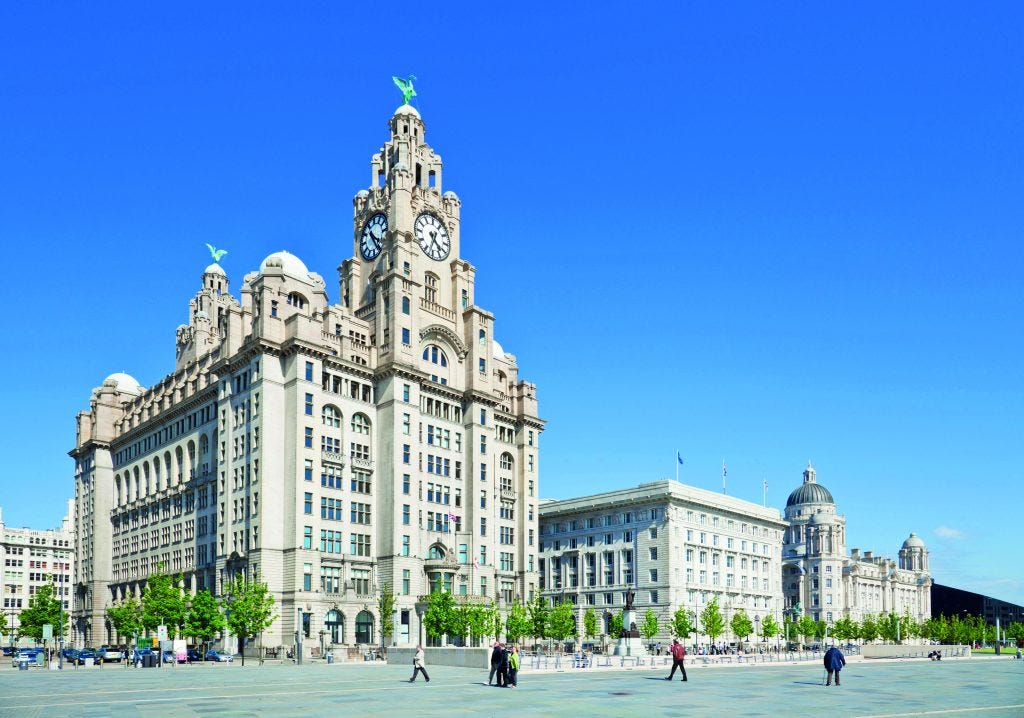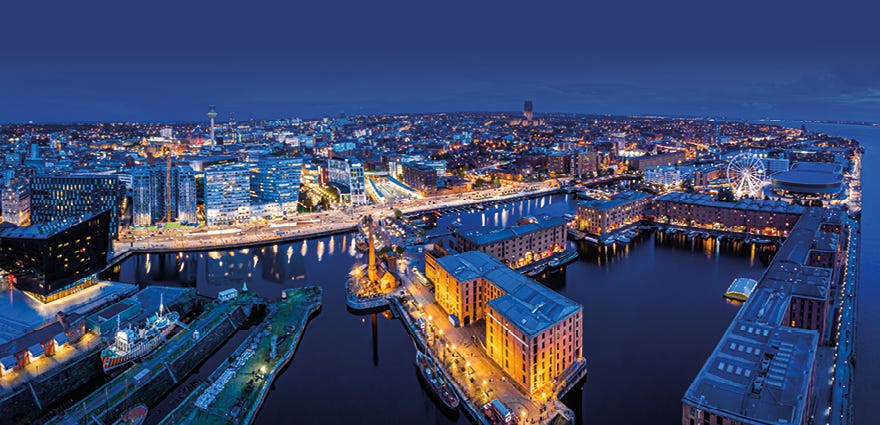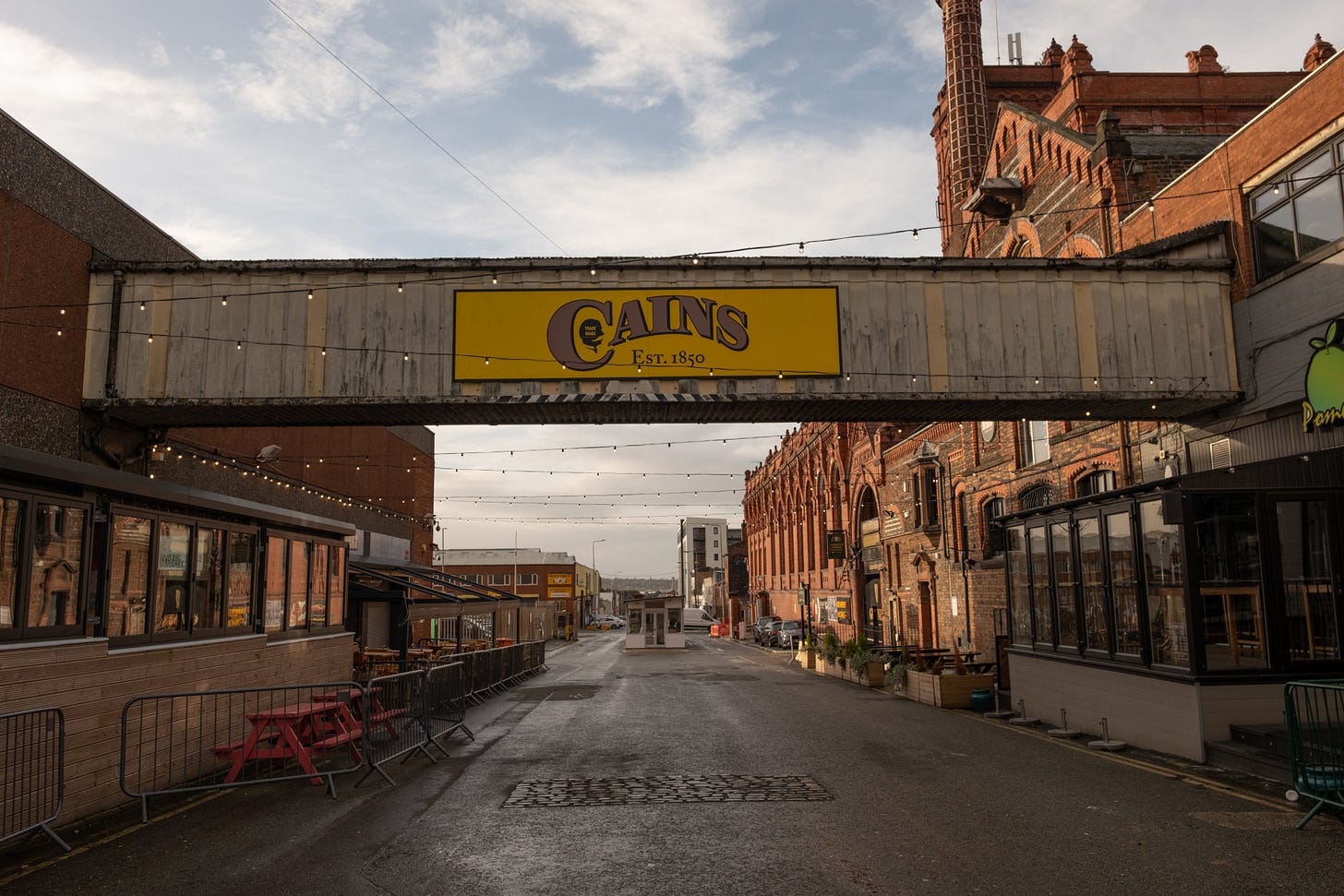🙋🏻♀️ Population: Just over 496,770 (1.5m in metro area)
📜 Date founded: 1207 (charter granted by King John)
🌇 County: Merseyside
🏛️ Most famous for: The Beatles, football, maritime history, and its UNESCO World Heritage waterfront
💰 Size of economy: Estimated at £35 billion
My direct experience of Liverpool is too limited. A couple of visits for a few hours each time. But I have never left anything other than deeply impressed; even in the rain.
From a softy southerner’s perspective, Liverpool – and its centre of gravity across the metropolitan area and Merseyside – has always looked to me like one of England’s big post-war successes. Beyond the deep and charmed Scouse-lore and its narratives of working class tough love, the sheer confidence of the city possibly surpasses anywhere else in clarity and consistency. It has always felt like a city that knows exactly how it shows up in the world.
Within you, without you
Liverpool’s economy thrives on an ability to blend heritage with the now. While its docks were once the engine of British trade, today, they manifest a different kind of booming tourism and cultural economy. The £5.5 billion Liverpool Waters regeneration project may upset some purists, but it is hard to argue that the reinvention that has promised to transform the city's northern docks into a hub of business, housing, and leisure is delivering.
Creative industries remain central to Liverpool’s enterprise story. With, of course, The Beatles still its global calling card, the city attracts millions of visitors annually to the Cavern Club, the Beatles Story Museum, and events like the International Beatleweek Festival. But it is foolish to get nostalgic. Liverpool is one of the UK’s fastest-growing tech hubs, with private equity and social enterprise (like Baltic Creative CIC) equally revitalising old warehouses into shared workspaces for start-ups.
Unemployment in Liverpool sits above the national average, reflecting the lingering impact of post-industrial decline. But programmes like the Knowledge Quarter consciously aim to close these gaps by linking education with local economic need. Anchored by the University of Liverpool and Liverpool John Moores University, this is home to cutting-edge research in life sciences, AI, and digital technologies. Recent developments, including the Liverpool Life Sciences Innovation Zone, aim to position the city as a global leader in biotech and pharmaceutical industries.
Taxman
Once the heart of Britain’s maritime trade, the city has successfully diversified its economic base, creating opportunities across advanced manufacturing, creative industries, green technologies, and logistics. Today, it stands as a major regional hub for innovation and entrepreneurship, supported by strategic investments such as the Liverpool City Region Freeport, the Urban Development Fund, and an extensive social enterprise ecosystem.
The jury is out on whether Freeports are an economic panacea; and the obsession with tax breaks as the single biggest motivator for investment does divide different groups for different reasons.
But the Liverpool City Region Freeport has become a cornerstone of the city’s contemporary economic strategy. Spanning a 45km radius around key locations like Port Salford and Birkenhead Docks, the Freeport is designed to attract high-productivity businesses while accelerating research and development in advanced manufacturing, pharmaceuticals, and green energy. Through business rate relief, and simplified customs procedures, the Freeport is expected to inject £850 million into the local economy, creating thousands of knowledge economy jobs in some of Liverpool’s most disadvantaged communities.
Mayor Steve Rotheram has been evangelical about the embedded principles of the Fair Employment Charter, and how this is the backbone of the Freeport framework, ensuring participating businesses provide well-paid, secure jobs that align with Liverpool’s values of inclusivity and sustainability. We’ll watch with curiosity.
All you need is love
Liverpool’s designation as a Social Enterprise Place by Social Enterprise UK is interesting, and makes tangible the city’s leadership in purpose-driven business. Home to over 1,400 socially trading organisations, Liverpool’s social enterprise sector generates an annual income of £3 billion and employs 45,000 people. From cultural institutions like the Shakespeare North Playhouse to urban farms and bike courier services, these organisations seem to be embedded in the city’s fabric, delivering economic, social, and environmental value.
Central to this success is Kindred, a Liverpool City Region initiative that provides funding and support to STOs. Backed by £5 million in initial investment, Kindred has attracted nearly ten times this amount into the region. Its focus on cultivating a sustainable social enterprise ecosystem ensures that Liverpool’s communities benefit directly from economic growth.
Liverpool’s creative sector remains one of its most vibrant economic pillars. The Baltic Triangle, once an industrial area, now serves as a hub for start-ups in gaming, media, and design. Companies like MilkyTea and the Liverpool Film Office are putting the city on the map as a centre for digital innovation. Meanwhile, Sony’s PlayStation research centre highlights the city’s appeal to global tech giants.
Tourism and the film industry continue to bolster Liverpool’s reputation as a cultural and creative hotspot. In 2019 alone, the city hosted 324 film productions, generating £17.6 million for the local economy. The upcoming Twickenham Studios outpost at the Littlewoods Pools building is a response to data that highlighted Liverpool’s position as the UK’s second-most filmed city after London.
Of course, Liverpool faces persistent challenges – and many of its successes have been hard fought and continue to be so. Unemployment remains higher than the national average, at 7%, and economic inactivity is compounded by health inequalities and skills gaps. The legacy of deindustrialisation continues to affect certain communities.
Keep reading with a 7-day free trial
Subscribe to A New England to keep reading this post and get 7 days of free access to the full post archives.






